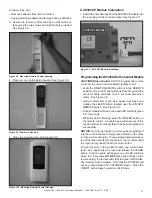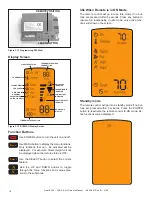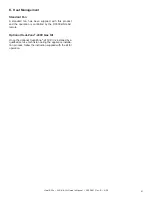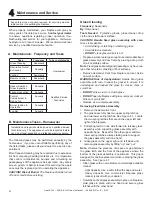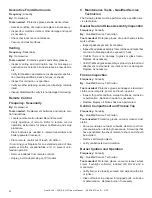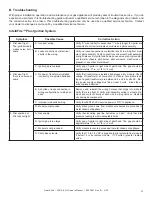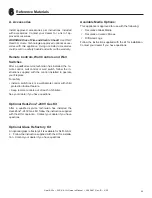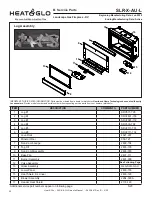
Heat & Glo • SLR-X-AU-L Owner’s Manual • 2653-981 Rev. B • 5/20
28
Intellifire™ Plus Ignition System - (continued)
Symptom
Possible Cause
Corrective Action
4. Pilot lights but contin
-
ues to spark, and main
burner will not ignite.
(If the pilot continues
to spark after the
pilot flame has been lit,
flame rectification has
not occurred.)
A. A shorted or loose connection in flame
sensing rod.
Verify all connections to wiring diagram in manual. Verify
connections underneath pilot assembly are tight. Verify
flame sense or igniter wires are not grounding out to metal
chassis, pilot burner, pilot enclosure or screen if present, or
any other metal object.
B. Poor flame rectification or contaminated
flame sensing rod.
With fixed glass assembly in place, verify that flame is en
-
gulfing flame sensing rod on left side of pilot hood. Flame
sensing rod
should glow shortly after ignition. With a multi-
meter, verify that current in series between module and
sense lead is at least 0.14 microamps. Verify correct pilot
orifice is installed and gas inlet is set to pressure specifi
-
cations. Polish flame sensing rod with fine steel wool to
remove any contaminants that may have accumulated on
flame sensing rod.
C. Module is not grounded.
Verify module is securely grounded to metal chassis of ap
-
pliance. Verify that wire harness is firmly connected to the
module.
D. Damaged pilot assembly or contami
-
nated flame sensing rod.
Verify that ceramic insulator around the flame sensing rod
is not cracked, damaged, or loose. Verify connection from
flame sensing rod to white sensor wire. Polish flame sens
-
ing rod with fine steel wool to remove any contaminants
that may have accumulated on flame sensing rod. Verify
continuity with a multi-meter with ohms set at lowest range.
Replace pilot if any damage is detected.
5. Appliance lights and
runs for a few minutes
and then shuts down
and/or appliance cycles
on and off.
A. A shorted or loose connection in flame
sensing rod.
Verify all connections to wiring diagram in manual. Verify
connections underneath pilot assembly are tight. Verify
flame sense or igniter wires are not grounding out to metal
chassis, pilot burner, pilot enclosure or screen if present, or
any other metal object.
B. Poor flame rectification or contaminated
flame sensing rod.
With fixed glass assembly in place, verify that flame is en
-
gulfing flame sensing rod on left side of pilot hood. Flame
sensing rod
should glow shortly after ignition. With a multi-
meter, verify that current in series between module and
sense lead is at least 0.14 microamps. Verify correct pilot
orifice is installed and gas inlet is set to pressure specifi
-
cations. Polish flame sensing rod with fine steel wool to
remove any contaminants that may have accumulated on
flame sensing rod.
C. Logs are set up incorrectly.
Remove and reinstall logs per the log placement
instructions.
D. Damaged pilot assembly or contami
-
nated flame sensing rod.
Verify that ceramic insulator around the flame sensing rod
is not cracked, damaged, or loose. Verify connection from
flame sensing rod to white sensor wire. Polish flame sens
-
ing rod with fine steel wool to remove any contaminants
that may have accumulated on flame sensing rod. Verify
continuity with a multi-meter with ohms set at lowest range.
Replace pilot if any damage is detected.
6. Carbon Deposition
A. Log Placement
Verify placement and assure flame is not excessively
impinging on log.
B. Shutter Setting
Check to assure correct shutter setting for your model and
gas type.
C. Gas Type
Assure correct fuel matches unit gas model and components.




